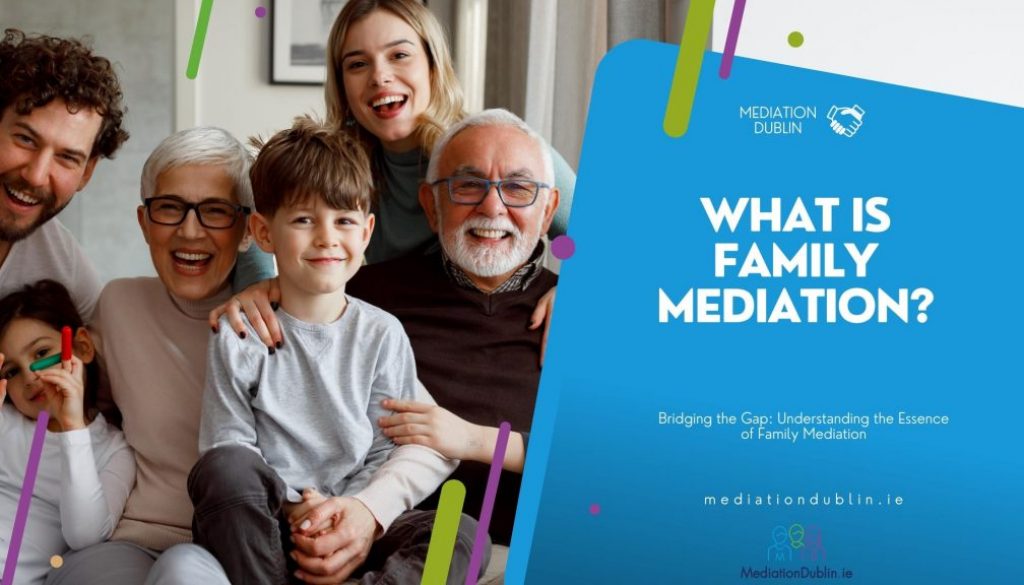What Is Family Mediation?

Family Mediation: Strengthening Relationships and Resolving Conflicts
Family dynamics can be complicated and disagreements within families frequently result in strained relationships and emotional distress. In such cases, family mediation may be a beneficial and successful tool for resolving disagreements, creating understanding and encouraging greater communication among family members. This article explores the notion of family mediation, its role in dispute resolution, the advantages it offers, the mediation procedure and real-life success stories.
Defining Family Mediation:
Family mediation is a voluntary and confidential procedure in which a neutral third party, known as a Mediator assists families in disputes in reaching mutually accepted solutions.
It creates a structured setting in which family members may share their worries, feelings and needs freely. Mediators are skilled experts who help to enhance dialogue, guide discussions and reach realistic solutions.
The Role of the Mediator:
A professional Mediator is essential in the family mediation process. They serve as a third party, ensuring that each family member has an equal opportunity to express themselves and be heard. Mediators maintain their objectivity while fostering an atmosphere of trust and respect.
They promote open communication, build understanding and assist families in achieving solutions that are in the best interests of all parties involved.
Understanding the Benefits of Family Mediation:
Family mediation has several advantages over traditional litigation or conflict. For starters, it provides a non-adversarial environment for family members to express their issues and viewpoints.
This procedure aids in the rebuilding of relationships, the promotion of good communication and the facilitation of understanding. Furthermore, family mediation is frequently faster, less costly and less emotionally exhausting than going to Court. It gives families the ability to actively engage in decision-making, resulting in outcomes adapted to their individual needs and circumstances.
Exploring the Family Mediation Process:
The process of family mediation often begins with an initial consultation in which the Mediator examines the issue and explains the procedure. Joint mediation sessions are organised if all parties agree to proceed.
These sessions include open talks in which family members can share their perspectives, find common interests and consider potential solutions. The Mediator facilitates the dialogue, manages emotions and assists in the creation of a mutually acceptable agreement.
Common Issues Addressed in Family Mediation:
Family mediation can address a wide range of issues, including but not limited to:
Elder care disputes: Family mediation can help resolve disputes about the care and well-being of senior family members. It addresses issues about living arrangements, medical decisions and financial management, helping families to make decisions that prioritise their ageing loved ones’ needs and aspirations.
Post-divorce conflicts: Even after a Divorce or Separation, disagreements about custody/access, parenting obligations or financial arrangements may emerge. Mediation provides a forum for addressing these recurring challenges, allowing parents to collaborate in their children’s best interests and preserve a cooperative co-parenting relationship.
Communication breakdown: Family mediation assists in the resolution of communication issues within families, such as misconceptions, miscommunications and a lack of effective discussion. Mediators enable enhanced communication strategies, allowing family members to express themselves in a more productive and empathic manner.
Divorce and Separation: Divorce and Separation are frequently fraught with significant emotional, legal and financial difficulties. To resolve these issues, family mediation offers a constructive and cooperative method. Mediators help couples navigate the divorce process by encouraging conversations about issues such as property distribution, child custody, spousal/child maintenance. Mediation, by encouraging open dialogue and understanding, assists couples in reaching mutually agreeable agreements while minimising conflict and upset.
Parenting disputes: When separated or divorced parents disagree on parenting duties and decision-making for their children, parenting conflicts can emerge. For parents to resolve these disputes, family mediation provides a neutral and child-centred atmosphere. Mediators assist parents in developing practical parenting plans that prioritise the children’s best interests, allowing for continuous collaboration and strong co-parenting relationships.
Inheritance and estate matters: When there is uncertainty or dispute over Wills, Trusts or wealth distribution, inheritance and estate concerns can cause friction and conflict within families. Family mediation provides a forum for family members to communicate their issues and interests openly and politely. Mediators facilitate conversations and assist families in reaching an agreement on how to distribute assets, manage disagreements and maintain connections.
Blended family challenges: Blended families can provide new obstacles, such as step-parenting, cohabitation and establishing roles and duties. By encouraging open communication and understanding, family mediation assists blended families in negotiating these issues. Mediators encourage talks about creating new family dynamics, setting clear expectations and resolving any problems. This contributes to the formation of a peaceful and cohesive mixed family unit.
Sibling conflicts: When disputes emerge between siblings, family mediation can help to discover mutually acceptable solutions. Mediators assist siblings in expressing their concerns, investigating underlying difficulties and developing techniques for successful communication and collaboration, resulting in improved sibling relationships.
Property disputes: Conflicts over property distribution or administration may emerge when family members jointly possess property, such as inherited land or a family company. Mediation is a systematic strategy for facilitating fair and equitable outcomes while maintaining family connections and resolving the financial elements of the property.
Trust and estate planning: Mediation can be useful in settling trust and estate planning issues, ensuring that family members’ preferences are addressed and understood. It aids in clarifying objectives, settling asset distribution problems and building peace among beneficiaries, reducing the likelihood of future disagreements.
Success Stories and Testimonials:
Family mediation has proven to be highly effective in resolving conflicts and restoring harmony within families. Real-life success stories highlight the transformative power of mediation. One client, John (Not a real name), shared, “Mediation allowed us to address our issues without animosity. It helped us find common ground and rebuild our relationship for the sake of the kids.” Such testimonials affirm the positive impact of mediation on individuals, relationships and overall family well-being.
Conclusion:
Family mediation is a constructive and inclusive technique for addressing family issues. It allows families to work through their differences, develop connections and discover long-term solutions by encouraging open conversation, understanding and mutual agreement. Family mediation is a great technique for establishing harmony and preserving good family dynamics due to its multiple advantages and effective outcomes.
Thank you for reading, Rachael, MediationDublin.ie


